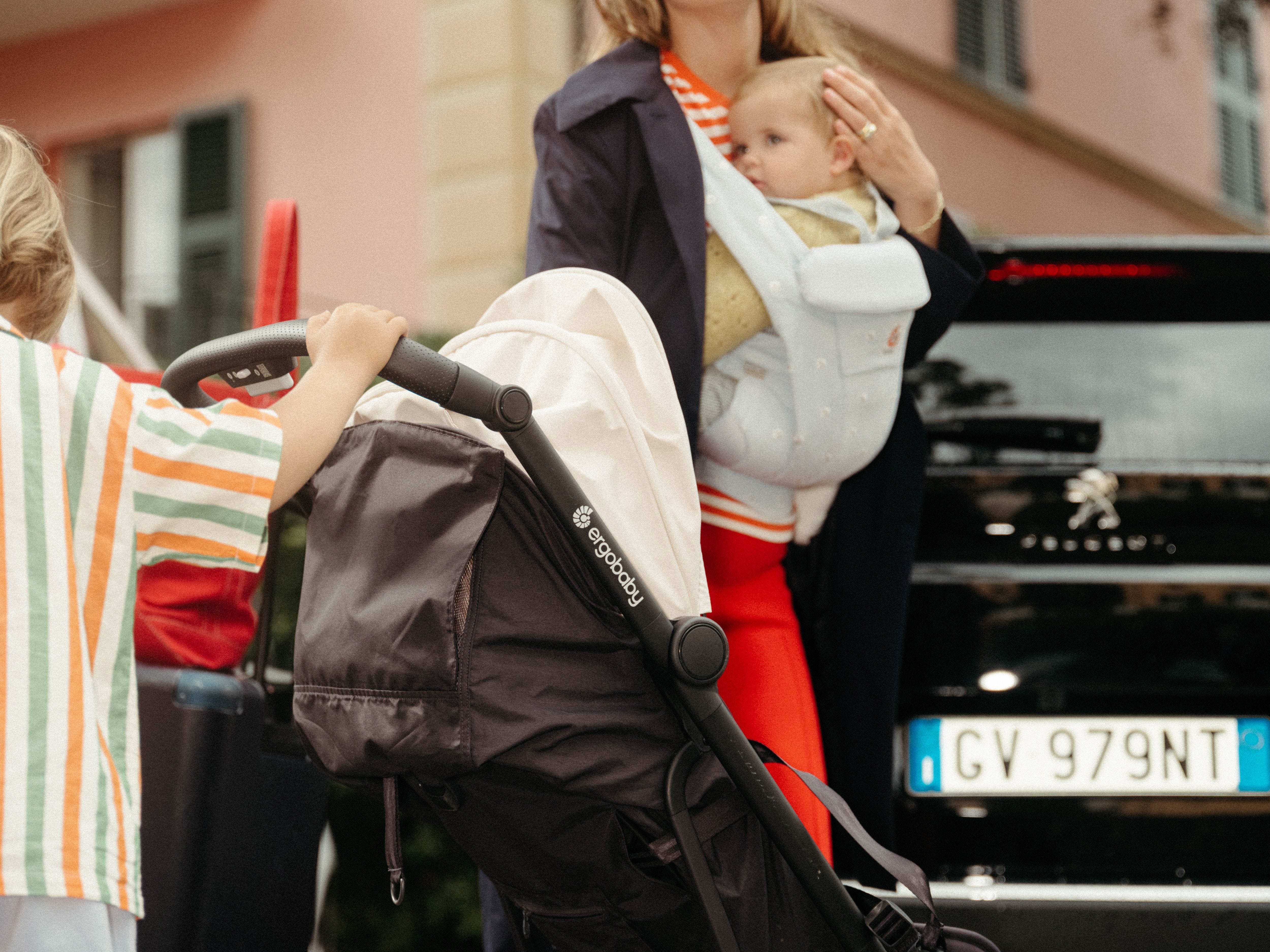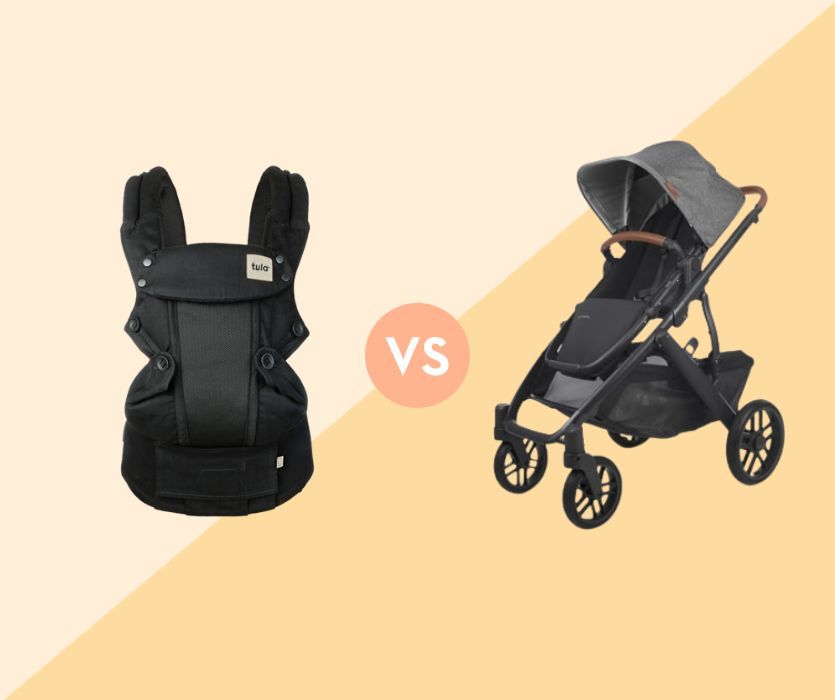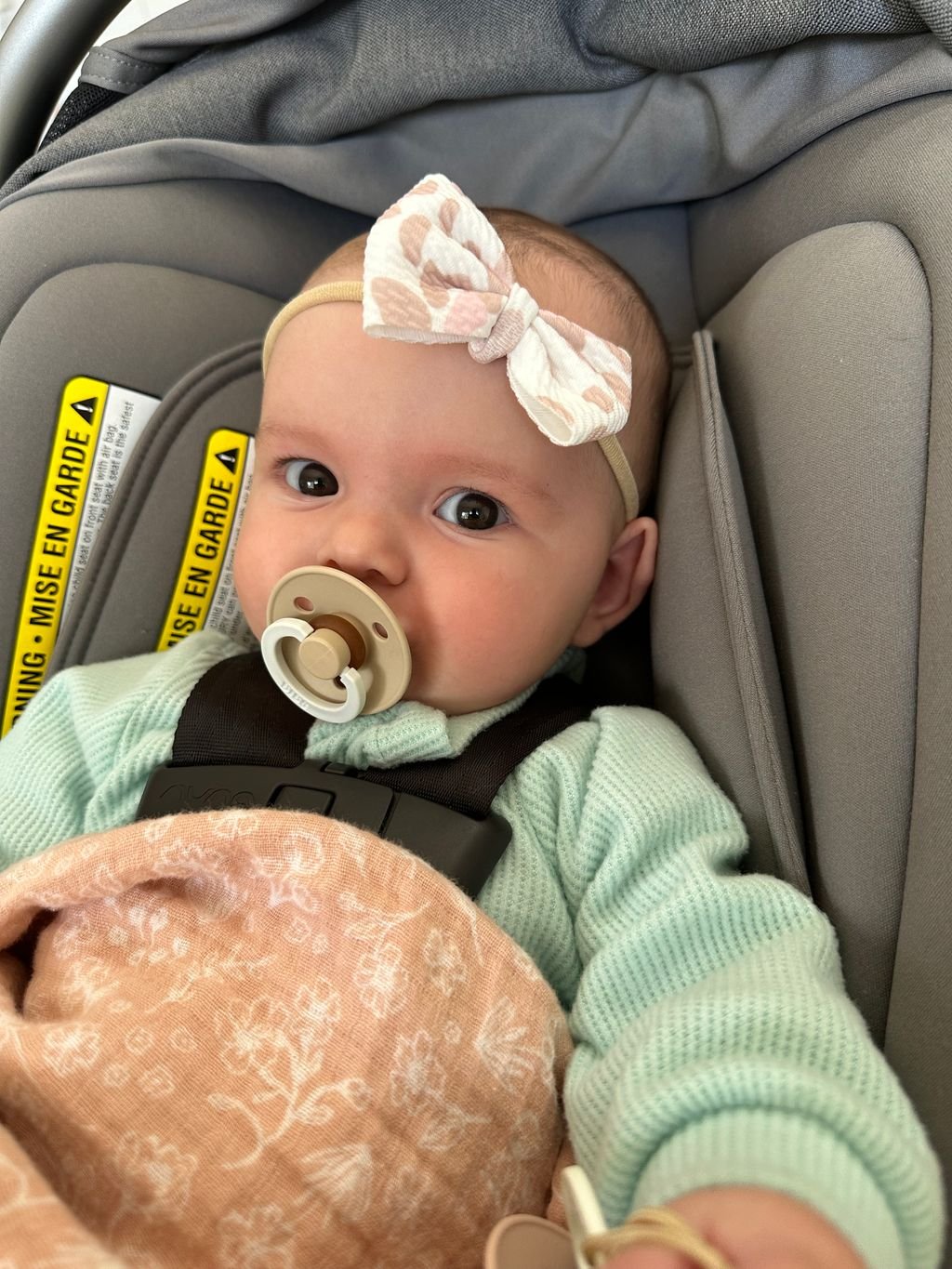Strollers and baby carriers are popular for transporting little ones. Each has unique features and benefits for parents.
Choosing between a stroller and a baby carrier can be tricky. Both offer convenience but in different ways. A stroller provides ease for longer outings with storage and comfort. On the other hand, a baby carrier offers close contact and hands-free mobility.
Comparisons help parents decide what suits their lifestyle best. Strollers shine for leisurely walks and shopping trips. Baby carriers excel for quick errands and crowded places. Understanding these differences guides parents to make informed decisions. In this blog post, we will explore both options. This will help you decide which aligns with your needs. Stay tuned for an in-depth comparison!

Credit: ergobaby.com
Introduction To Baby Transportation
As a parent, you want your baby to be comfortable and safe, whether you’re at home or on the go. Baby transportation is a crucial aspect of this. From quick errands to long strolls in the park, the way you choose to transport your baby can greatly impact both your experience and theirs.
Gone are the days when a stroller was the only option. Today, baby carriers offer a convenient alternative, allowing you to keep your little one close while freeing up your hands. But how do you decide between a stroller and a baby carrier? Let’s delve into the changing trends and the importance of choosing the right option for your family.
Changing Trends
In recent years, baby transportation has evolved significantly. Strollers have become more advanced, featuring lightweight designs and easy folding mechanisms. These improvements cater to busy parents who need quick solutions.
On the other hand, baby carriers have gained popularity for their ergonomic designs and ability to promote bonding. They allow you to keep your baby close, fostering emotional connections while you multitask. It’s fascinating how modern designs prioritize both comfort and practicality.
Think about your lifestyle. Do you often find yourself in crowded spaces where a stroller might be cumbersome? Or do you prefer longer walks where a stroller could be more convenient? Understanding these trends will help you make an informed choice.
Importance Of Choosing Right
Your choice between a stroller and a baby carrier should be based on your specific needs. Consider your baby’s age and your daily routine. Newborns often feel secure in carriers, while older babies might enjoy the freedom a stroller provides.
Imagine you’re planning a trip to the zoo. Would a stroller be easier for long hours of walking, or would a carrier allow you to move more freely? These considerations are essential in ensuring both you and your baby remain comfortable.
Personal experience can be invaluable here. I once opted for a carrier during a busy family event, thinking it would be easier. However, my baby preferred the stroller for a better view and more space to nap. It taught me the importance of assessing each situation individually.
So, what’s your priority? Is it convenience, comfort, or flexibility? Identifying what matters most to you will guide you to the best choice for your family.
Benefits Of Strollers
Comparing strollers to baby carriers highlights convenience and comfort. Strollers ease strain on your back and shoulders. They offer storage space for baby essentials, making outings simpler.
When deciding between a stroller and a baby carrier, many parents find themselves weighing the pros and cons. Strollers offer a variety of benefits that cater to both the parent and the child. They are a staple for many families due to their versatility and ease of use.Convenience And Comfort
Strollers provide exceptional convenience for parents on the move. They allow you to keep your hands free while your baby enjoys a smooth ride. With adjustable seats, your little one can nap comfortably or sit upright to explore their surroundings.The comfort factor extends to you as well. Pushing a stroller is often easier than carrying a child for long periods. You can cover longer distances without feeling exhausted, making outings more enjoyable.Storage And Accessibility
One of the standout features of strollers is their built-in storage. Most strollers come with a basket underneath, perfect for carrying diaper bags, snacks, and other essentials. This extra space can make all the difference during a day out, saving you from juggling bags and baby gear.Strollers also offer easy accessibility. Many models fold effortlessly, allowing you to store them in your car trunk or in small spaces at home. This foldability makes them ideal for quick transitions, whether you’re hopping on public transport or heading to a café.Have you ever found yourself wishing you had more than two hands when out with your baby? A stroller might just be the solution. It combines functionality with comfort, making it a valuable asset in your parenting toolkit.Drawbacks Of Strollers
Strollers offer convenience but have notable drawbacks. Many parents face challenges with strollers. These challenges range from space issues to terrain limitations. Understanding these drawbacks can help make informed decisions. Let’s dive into the specifics of stroller limitations.
Space And Portability Issues
Strollers often take up significant space. They can be bulky and hard to store. Families with small homes struggle to find storage room. This can lead to clutter. Transporting strollers in cars is also tricky. They require ample trunk space. Smaller vehicles may not accommodate large strollers. This limits travel options for families. Portability becomes a major concern.
Terrain Limitations
Strollers perform well on smooth surfaces. But rough terrains pose problems. Uneven paths and gravel are tough to navigate. Hiking trails are often inaccessible. City sidewalks can also be challenging. Potholes and curbs disrupt stroller movement. Parents face difficulties in busy urban areas. This restricts outdoor activities. Terrain limitations make strollers less versatile.

Credit: planashleygo.com
Advantages Of Baby Carriers
When choosing between a stroller and a baby carrier, many parents find themselves weighing the advantages of each. Baby carriers offer unique benefits that can make a world of difference in your daily routine with your little one. From fostering deeper bonds to providing ease of movement, carriers can enhance your parenting experience in unexpected ways.
Bonding And Closeness
Baby carriers allow you to keep your child close to your heart, literally. This closeness can foster a strong emotional connection between you and your baby. Feeling your warmth and hearing your heartbeat can soothe your child, making them feel secure.
Imagine walking through a park with your baby nestled against you. The world around you fades away as you share a special moment, feeling connected and in sync. This bonding time is invaluable and can be hard to achieve with a stroller.
Being physically close also means you can respond quickly to your baby’s needs. Whether it’s a gentle pat to calm them or a reassuring word, your presence is immediate. How might these interactions impact your child’s development?
Ease Of Movement
Think about navigating crowded places or uneven terrains. A baby carrier provides flexibility and freedom that a stroller simply can’t. You can easily move around without the hassle of maneuvering a bulky stroller.
Have you ever tried catching a bus with a stroller? It can be a juggling act. With a baby carrier, you can hop on and off public transport effortlessly. This ease can be a game-changer, especially in urban environments.
Moreover, carriers allow you to have your hands free. Whether you’re shopping, cooking, or attending an event, you can multitask while keeping your baby close. How often do you find yourself wishing for an extra pair of hands?
Incorporating a baby carrier into your daily routine can simplify your life, offering both practical benefits and enriching emotional experiences. As you consider your options, think about how a carrier might enhance not only your mobility but also your relationship with your child.
Challenges With Baby Carriers
Baby carriers offer hands-free convenience but come with challenges. Parents enjoy the closeness and mobility these carriers provide. Yet, they must consider certain drawbacks before choosing them.
Weight And Duration
Baby carriers can become heavy, especially with growing infants. Carrying a baby for long periods may lead to discomfort. Parents often find themselves adjusting straps frequently. This constant adjustment can become tiring.
Back And Shoulder Strain
Improperly adjusted carriers can strain the back and shoulders. This discomfort might increase with prolonged use. Parents may experience soreness, leading to potential long-term issues. It’s essential to maintain proper posture while using a carrier.
Age And Development Considerations
Choosing between a stroller and a baby carrier depends on age and development. For infants, baby carriers offer closeness and comfort. Toddlers benefit from strollers with support and space. Each option suits different growth stages, ensuring safety and ease for both parent and child.
When deciding between a stroller and a baby carrier, age and development considerations are crucial. Each stage of your child’s growth presents unique needs. Understanding these can help you make the best choice for your little one.Newborns Vs. Toddlers
Newborns require a lot of head and neck support. Their muscles are still developing, making a baby carrier ideal. A carrier allows for close contact, which can be soothing for both you and your baby.As your child grows into a toddler, their needs change. They become more curious and active. A stroller might be more suitable now, offering them a chance to observe the world while giving you convenience during longer outings.Have you ever noticed how toddlers love to point at everything? A stroller’s higher vantage point can satisfy their curiosity. Plus, it saves your back from the strain of carrying a heavier child.Developmental Support
Developmental support is paramount in your decision. A baby carrier should provide proper ergonomic support. This ensures your baby’s hips and spine are in a healthy position.Strollers, on the other hand, should have adjustable seating. This allows your child to sit upright or recline as needed. Consider your child’s comfort and safety as they grow.Think about your daily routines. Are you often on the move, or do you enjoy leisurely walks? Your choice between a stroller and a baby carrier may depend on these habits.Ultimately, your child’s age and developmental stage should guide your decision. Every child is unique, and what works for one may not work for another. What matters most is your child’s comfort and your peace of mind.Lifestyle And Activity Factors
Choosing between a stroller and a baby carrier depends on your lifestyle. Your daily activities and environment play crucial roles. Both options have unique benefits. Understanding your lifestyle helps in making the right choice.
Urban Vs. Rural Living
Living in a city often means crowded streets and public transport. A baby carrier suits urban parents. It offers flexibility and mobility in tight spaces. Strollers can be bulky in crowded areas. In rural areas, open spaces make strollers practical. They provide comfort during long walks. Terrain can be challenging, so sturdy wheels help. Consider your surroundings before deciding.
Outdoor Activities
Parents who enjoy outdoor activities need to consider their child’s comfort. A baby carrier works well for hiking or walks in nature. It keeps your hands free. It also allows you to navigate rough terrains easily. Strollers are ideal for flat surfaces like parks or sidewalks. They offer storage for essentials. Your activity choice impacts your decision greatly.
Safety And Health Concerns
Choosing between a stroller and a baby carrier involves safety and health considerations. Strollers offer stability but can be bulky. Baby carriers promote bonding and freedom of movement but may strain your back. Carefully assess your needs for a safe and comfortable choice.
When choosing between a stroller and a baby carrier, safety and health concerns are top priorities for any parent. Both options have their unique advantages and potential risks. It’s crucial to understand how each can impact your child’s well-being. By doing so, you can make an informed decision that aligns with your family’s needs.Proper Usage Guidelines
Correct usage is vital for both strollers and baby carriers. With strollers, always ensure your child is securely strapped in with the harness. Regularly check the brakes, especially on slopes or uneven surfaces.For baby carriers, adjust the straps to ensure your baby is snug against your body. The carrier should support your baby’s head and neck. Make sure their face is visible at all times to prevent any breathing issues. Improper use might lead to discomfort or even injury.Potential Health Implications
Strollers and baby carriers both have health implications you should consider. Strollers often promote a sedentary lifestyle, limiting your baby’s movement. They can also lead to poor posture if used excessively.On the other hand, baby carriers encourage closeness and bonding. However, they might pose a risk of hip dysplasia if not used correctly. It’s crucial to ensure your baby’s legs are in an “M” position.Have you ever thought about how these choices impact your daily routine? Balancing convenience with health can be challenging, but it’s essential for your child’s development. Choose wisely and always prioritize your baby’s safety and comfort.Cost And Budget Considerations
Choosing between a stroller and a baby carrier involves budget considerations. Strollers often have higher upfront costs. Baby carriers tend to be more affordable, but each option has its own unique value and features for different needs.
When choosing between a stroller and a baby carrier, cost and budget considerations can significantly impact your decision. Both options offer unique advantages, and understanding their financial implications can help you make a smart choice. Let’s dive into the initial investment and long-term value to guide your decision.Initial Investment
Purchasing a stroller often involves a higher upfront cost. They range from basic models to luxury designs, with prices that can vary dramatically.A baby carrier, on the other hand, tends to have a lower initial price point. You can find affordable options without compromising on quality or comfort.But is cheaper always better? Consider what features you truly need. Investing in a mid-range stroller or a well-reviewed carrier might save you money in the long run.Long-term Value
Think about how long you’ll use each option. A sturdy stroller might serve you well over several years, accommodating your growing child and different terrains.Carriers offer convenience during the infant stage, but may not be as useful once your baby grows heavier.You might sell or pass down a high-quality stroller, recouping some of your initial costs. Carriers, due to wear and tear, might not hold their value as well.How do these insights align with your budget? Consider your lifestyle and baby’s needs to determine which option offers the most bang for your buck.
Credit: blog.sunshinebilingual.com
Making The Right Choice
Choosing between a stroller and a baby carrier can feel overwhelming. Each option has its unique benefits. Parents must weigh these against their lifestyle. Making the right choice depends on several factors. Consider personal preferences and family needs. These elements shape the decision-making process.
Personal Preferences
Consider your comfort and style. Some parents prefer the ease of a stroller. It allows for effortless travel with the baby. Others value the closeness of a baby carrier. It keeps the baby near and secure. Think about your daily routine. Does a stroller fit better with your activities? Or does a carrier offer the flexibility you need?
Family Needs
Assess the specific needs of your family. A stroller offers storage space for baby gear. It can be ideal for families with multiple children. A baby carrier provides hands-free mobility. It suits parents who are often on the move. Consider the terrain and environments you frequent. Each option has different advantages in various settings.
Frequently Asked Questions
What Is Better, A Baby Carrier Or A Stroller?
Choosing between a baby carrier and a stroller depends on your needs. Baby carriers offer closeness and mobility. Strollers provide convenience and storage. For travel, carriers are compact. Strollers suit longer outings. Consider lifestyle, comfort, and baby’s age to decide.
Both have unique benefits for different situations.
When Should Kids Stop Using Strollers?
Kids typically stop using strollers between ages 3 to 5. Consider their physical development and walking ability. Transition gradually, encouraging walking for short distances. Ultimately, parents should assess individual needs and comfort.
What Are The Disadvantages Of Baby Carriers?
Baby carriers can cause back strain and discomfort for parents. Incorrect use may lead to hip dysplasia in infants. Overheating is a risk, especially in warm weather. Not all carriers provide adequate head support for newborns. Some designs may not distribute weight evenly, causing imbalance.
What Is The Healthiest Way To Carry A Baby?
Carry your baby in an ergonomic carrier to support their hips and spine. Ensure the carrier allows for a natural sitting position. Keep your baby close to your body, with their face visible and airway clear. Distribute weight evenly across your shoulders and hips for comfort and safety.
What Are The Benefits Of Using A Stroller?
Strollers offer comfort and support for long outings. They provide storage space for baby essentials.
Conclusion
Choosing between a stroller and a baby carrier depends on your lifestyle. Strollers offer comfort for long walks. Baby carriers provide closeness and convenience. Both have their unique benefits. Consider your daily activities and preferences. Think about space and ease of movement.
Families often find both useful at different times. Evaluate your needs and decide accordingly. Your choice should suit your family’s routine. Remember, comfort and practicality are key. Making the right decision simplifies outings with your little one. Enjoy every moment with your child, whether strolling or carrying.



